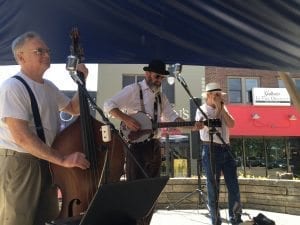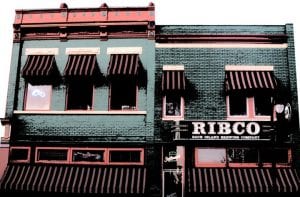EXCLUSIVE: Rock Island Mayor Mike Thoms Addresses 2 a.m. Bar Closing, Issues With District
EXCLUSIVE: Controversy erupted with the ferocity of a barroom brawl on social media Monday night after the Rock Island City Council voted 4-3 to indefinitely maintain a 2 a.m. closing time for bars in the downtown Rock Island District area.

Dylan Parker is alderman for the downtown area including the District.
It’s worth noting that one of the people voting against the measure was alderman Dylan Parker, whose ward includes the District. The other two were Ivory Clark and Dave Keenan.
It’s also worth noting that Parker’s vote against the continued closure is representative of the opinions of his constituency, the bar owners, which were hoping that the council would go back to a 3 a.m. closing time. The owners maintain that the extra hour and the booming business it gets from people crossing the river from Iowa (where bars have long closed at 2 a.m.) are necessary to keep them afloat, especially given the heavy hits their businesses have taken over the past year due to covid.

Billy Bob’s in Rock Island closed its doors last year due to business losses incurred due to the covid pandemic. There has been some talk about the bar moving to Iowa.
Already, a number of bars in the District have closed down for good – including Black Sheep and Billy Bob’s – and one, Big Swing, was forced to close temporarily. In wake of Monday night’s decision, according to some sources, MD Green’s is looking to close down as well, and there have been rumors of at least two other bars talking of closing.
In the wake of the decision, and its immediate impact upon the area, I called Rock Island Mayor Mike Thoms to ask him about the vote, his stance on it, and its lasting impact.
Thoms insisted the ban was not permanent and could be changed at any time in the future. However, he did acknowledge there was no plan to change it at the moment. Below are some snippets from our conversation, edited for brevity and clarity.
QuadCities.com: What is the plan here? Obviously, there’s a reason for this, one of which is to ameliorate issues that arise when people come over from Iowa, but District bar owners are not happy about it, because they have a significant spike in business in that last hour. What is the thinking in regard to this and how can you help those businesses going forward so that they don’t go under and the downtown turns into a ghost town of empty buildings?

Rock Island Mayor Mike Thoms
Mike Thoms: We need to work on changing the perception (of downtown Rock Island) and working on a new day and not the past days. Yes, there is an overarching plan and vision, and I’ll tell you what that is. But to go (in another direction), that’s maybe where I, and Dylan, disagree is when to implement this vision, and what should come first. I’m not saying I’m right or wrong or he’s right or wrong, we may not know until after the fact. We’ll see. But we need to do something drastic to change the image (of the downtown). You can do all the TV commercials you want, but up to this point it hasn’t changed much. You know, you look at statistics, and it says if you have one bad experience you tell nine people, you have one good experience you tell three. We have one bad experience down here and you’ve got the TV cameras down here and people sharing video to social media and everything and it undoes everything we’ve done. So we needed to do something drastic and totally different to change the image. Part of it will be for perception, part of it will be for reality. The plan is to establish this downtown task force, and that’s been done, made up of diverse people from throughout Rock Island. People from all different backgrounds, to get all different perspectives. One of those decisions was to hire a downtown manager. That was not a City Hall decision, that was a task force decision. The City Council had to approve the budget, but that was the public making that decision. Another decision was to team up with the Chamber. Those decisions were made by the committee.
QuadCities.com: I thought that was a savvy move. I’ve always thought it would be a good idea for the Quad-Cities to adopt a more overarching plan as a larger metro market rather than continuing on with the parochialisms of cities and states dividing us. And since Rock Island has, for at least the last decade, maybe a little more, been lagging behind the other cities and their downtowns, I thought it was a good idea to team up with the Chamber to get something going in terms of putting Rock Island more into the mix as those other cities are on the rise.
Mike Thoms: Yeah, that’s the thinking. There are a number of reasons you want the Chamber involved. There are a number of businesses that belong to the Chamber, and the more people you can get to buy into the process, the better results you’re going to get. If the Chamber is involved, they’re going to talk about our new businesses at their meetings, put it on their websites and social media, and that’s going to help us, and hopefully get us some more positive attention across the Quad-Cities. It’s two year contract, so it’s not a huge obligation, so if it doesn’t work out, we can move on. But it’s worth a try, we’ll see what happens.
QuadCities.com: One of the things I’ve heard is that you’re looking to convert the District into something more along the lines of a downtown LeClaire, or Galena, or even more like the Village of East Davenport. Is that something that you’re looking at?
Mike Thoms: We want more independent entrepreneurship and retail, whether that’s a shop or a café… but to say you want it and to do it are two different stories. That’s why I’m frustrated with some people out there… you can’t just wave a wand and people will start knocking on the door. That’s not happening. That hasn’t been happening. You’ve got to do something to get businesses here.

Paul Rumler is president/CEO of the Quad Cities Chamber of Commerce. Rock Island recently entered into a deal with the Chamber to help develop its downtown.
QuadCities.com: I think Rock Island needs more incentives for SMALL businesses to open up, to allow people who want to start a business but maybe don’t have the capital, more of an opportunity to do so, and to help in clearing the way to fill up the empty spaces down there. One of the things I’ve long thought Rock Island needs to do is embrace its cultural diversity and its eclectic nature. We’re one of the most culturally diverse cities in the area, and we’ve got a lot of artistic and creative people here, and the downtown and the city should embrace that and do more to encourage small businesses that reflect that diversity. I think that’s something that none of the other cities are overtly doing and it could help us stand apart, and not so much create our own identity as a city but celebrate the identity that we have as a city that’s culturally vibrant and diverse.
Mike Thoms: I agree, I think that’s a great thing, but the downside is, a lot of time people don’t have the capital to do that…
QuadCities.com: Exactly! That’s why I think there needs to be more help from the city in regard to that…
Mike Thoms: Definitely, and we certainly would love to encourage that and help, but the downside is, we don’t have much cash. The city doesn’t have that ability to help them. It’s not that we don’t want to, it’s that we don’t have the budget to. We don’t have the cash to do it. That’s another problem, that’s going to take a lot of thinking, and work, to overcome. But going back to your original question, yes, that’s our vision, that’s how we see the downtown. We want to view the downtown not just as those two blocks of the District, we are taking a look at the downtown as from the river up to about 7th Ave., and from Centennial Bridge to about Wake Brewing. People keep talking about the two blocks of the District, but we want to change the perception of that whole area, not just those two blocks. But that’s the thing, if you want those different businesses, you have to look at things differently. That’s where the downtown manager comes in place, because they have to build the relationships with the building owners down there, so that they can work with the city, and hopefully come up with some money to help seed those businesses down there. Now that’s going to take multiple years to get there, it just doesn’t happen overnight. But that’s the vision.
QuadCities.com: So then where does this move, to the 2 a.m. close, fit into all that?
Mike Thoms: To kickstart this, and this is where the 2 a.m. comes from. The city has got a million and a half dollars to put into downtown. And so we want to put our best foot forward first and show the private industries that the city is committed to downtown. So the task force

At one point, the District was known for hosting regular Wednesday concerts during the day which would be frequented by many people working in the businesses downtown.
looked at that revitalization plan we had done in 2015 and asked what’s going to give us the biggest bang for our buck. If you put that money into the downtown to put up new lighting, to widen the sidewalks, to make all the fences and such match up, so that it’s aesthetically great, you’ve got more of a wow factor. So then you talk to the business owners and see if they can clean things up in their own facades, to create a better image. And you talk to the realtors to see if they can put smaller signs up. And then you get that wow factor, the downtown starts looking better, it’s more aesthetically pleasing so that businesses look at it and are more likely to consider it as a place to build. That starts things going. That’s the vision. Now, whether or not the 2 o’clock should come before or after that, that’s the question. Do you keep on having that extra sales tax revenue from that extra hour or do you take those steps to help clean up things and start to move forward on that, that’s the question.
QuadCities.com: Exactly! If the city needs money, which we can both agree it does, and the businesses are all saying that their biggest sales time is between 1 and 3, and specifically 2 and 3, doesn’t closing the bars down deprive the city of that extra sales tax revenue that they otherwise would’ve gotten? And especially if these businesses close and leave, you’re left with even less sales tax money coming in and even more empty buildings down there. I mean, I hate to bring up the Walmart thing, because it’s not the same thing, but this is another case of putting the cart before the horse, it’s somewhat similar in that you’re making a decision without any guarantees and hoping that thing is going to arrive.
Mike Thoms: That’s where sometimes we differ in opinions, is when to take this action, what to do first. But you’ve also got to look at it realistically. Do you know how much sales tax was paid, to the city, in 2019, before the pandemic, from the bars and restaurants (downtown)?

Rock The District was a popular event in the downtown.
QuadCities.com: No, I don’t have the figures in front of me. Do you? I’m assuming you do, otherwise you wouldn’t have brought it up. (laughs)
Mike Thoms: It’s $22,000.
QuadCities.com: For the entire year.
Mike Thoms: The entire year.
QuadCities.com: For the bars and restaurants in the District.
Mike Thoms: Just for the downtown. I’m not saying that’s nothing, but I don’t want people thinking that it’s hundreds of thousands of dollars. Now, that doesn’t count the tax money that goes to the state, that’s just the money that goes to the city, but it’s not as much of an amount as people might think. We charge one-and-a-half percent food and beverage tax. The state charges, six and one quarter percent? We’re not counting that. We don’t get that. That’s not the same as the money that goes to the state. Now I’m not saying it’s a good thing if there are empty buildings or if businesses leave, I don’t want to belittle that. But there are some people out there who are saying that the 2 a.m. closing is a good thing. They’ll point to the number of people who come over here after the bars close in Iowa, and just linger outside, and those are the people who a lot of the time are causing the problems, is the ones lingering outside, not the ones going into the bars. This helps address that issue. If we eliminate that, that eliminates some of the problems. Police track the numbers for problems and crime and those numbers escalate between midnight and 3, and especially between 2 and 3, so this helps eliminate that.
QuadCities.com: Well, yeah, that makes sense, because as people get more drunk, they’re more likely to get into fights or do stupid things, that’s nothing new. Nor is it anything that’s unique to the District.
Mike Thoms: That’s right. So by closing at 2 o’clock you’ve at least eliminated some of that crime, because you don’t have that extra hour.
QuadCities.com: I can understand the logic in regard to it. But I think the question is, what now? If you’re going to do this, what’s the plan to make up for the lost revenue to those businesses and to the city and to make something happen? Otherwise you’ve gone from a spot where there are a lot of bars to potentially a spot where there are just a lot of empty buildings and departed businesses.
Mike Thoms: Yeah, now this closing the bars at 2 is not the total answer, but we needed to do something this year. So we’re hiring a downtown manager, creating a task force, investing a half-million dollars, going to utilize the downtown revitalization plan. We’re doing those things this year, so that next year, when we’re (out of covid), we can move forward on the bigger plan.

Rock Island Brewing Co. in The District saw its 2020 and 2021 schedule of live music decimated due to covid-19.
QuadCities.com: Yeah, I’m interested to see how this is going to shake out, because everything is skewed because of covid anyway over the past year, and who knows how long it’s going to last this year, and what’s going to happen. Especially since we’re on the border with Iowa. You’ve got two states, one of which has no mitigations at all, the other of which I think has reasonable mitigations, but still, some people don’t want to partake in them. So many people are already going to Iowa anyway, and it’s been hurting Illinois side bars. So I guess looking at this, and the fact that there have been some stimulus packages in place to help businesses, why didn’t you start looking to do this earlier last year? I mean, if the businesses are having to be closed anyway due to quarantine, and they’re able to be helped out at least in some way by the PPP program or other stimulus grants or whatever, why not start building and move forward on this plan when 2 or 3 a.m. doesn’t matter because all the bars and restaurants are closed anyway due to quarantine? Because it would’ve given you a year or two head start.
Mike Thoms: Well, yeah, that’s why we want to get started this year, because covid’s going to screw us up anyway, so why not take advantage of construction season this year to get started on the developments rather than waiting until 2022 and letting another year go by where we’re going to get hit hard anyway.
QuadCities.com: Speaking of the stimulus, we’re looking at a $1.9 trillion stimulus plan that’s going to be passed here in the next couple of weeks. I mean, the only thing that really might get put by the wayside is the minimum wage hike, but the rest of it looks like it’s going to be passed with no problem, and that money will start to flow outward into the economy sometime in March. Now, I haven’t taken a look at the details of it, but if it’s anything like the last stimulus, and according to the reports I’ve read it is in some ways, are there programs in it that could help out these area businesses that are going to be hurt by this dip back to 2 from 3, and also are there programs in it that could help Rock Island on this move to revitalize downtown?
Mike Thoms: Yes, we’re definitely going to look into that. Because if you look at the city, we’ve always wanted to do more grants than loans, because obviously you don’t have to worry about paying those back, and so we’re going to definitely be looking into this bill to see how it could help. As for the local businesses, we know there were a lot of programs to help out in the last stimulus bill, but that’s up to the individual businesses to apply for those. Now, one of the things is that most of the money is for existing businesses, so I don’t know if there’s going to be any money for new businesses or seeding business. Now, I haven’t seen the bill so I don’t know, and we’ll look into that, but we don’t know about that yet.
QuadCities.com: I know you have a conference call coming up in a few minutes, anything else you’d like to add?
Mike Thoms: Yeah, there’s something that I brought up that nobody seems to be able to answer for me. All this time, the closing time for bars in Iowa has always been 2 a.m. Look at how many bars over there that have been there for years, look at Mac’s Tavern and places like that, and they’ve stayed around and they’ve made money… why is it that those bars over there are able to do it, but we’re not able to do the same?
QuadCities.com: I’m not sure. It’s probably a number of factors. And the District bars used to be jumping back in the ’90s and into the middle of the ’00s, so it’s not like this has always been the case. But then again, there were a lot more downtown businesses in general open back then, and so you had a lot more people coming down here all the time. Plus you had the festivals and a whole lot of other things that went away over the past decade. Maybe it’s a state thing, with people being more parochial and wanting to stay on their side of the bridge, I

Stephanie Acri is mayor of Moline.
don’t know. What about Moline? I know they’ve got a couple of bars that go to 3, what’s the situation like there?
Mike Thoms: They’ve got a couple, but not many, not all. There are a couple places like clubs, but mostly it’s just like Eagles Clubs or the Elks or something that have the license until 3. But I’ve talked to Stephanie Acri, the mayor over there, about this, and she’s used that 3 a.m. time as a penalty to be taken away if there are problems with bars, if they have issues she can push them back to 2. The only ones that are a problem are the nightclubs, not the Elks and stuff like that. Would someone go to Moline instead of Rock Island because they can go to a place until 3? Maybe, but they’ve got an occupancy requirement, so not too many. But back to what I was saying about Iowa, and some of the bars that have left the District or are looking to leave the District to move over to Iowa. Now why? If they have a problem with the 2 closing here, Iowa already has the 2 a.m. in place and has for a while, so why is 2 a.m. ok there but not here?
QuadCities.com: Because they think they’d get more business before 2 a.m. over in Iowa, so if all things are level, they’ll look at moving over there if they can get more people in the doors before that time.
Mike Thoms: So we want to take the scraps so to speak from 2 to 3, because we can’t get the reputation that Davenport’s got? Now isn’t that sad.
QuadCities.com: Well… yeah, it is. I hate to say it, but there’s a negative perception of Rock Island, which is wrong to me and certainly

Rock Island Mayor Mike Thoms
frustrating because there’s just as much crime and just as many problems if not more in the bars over there in Iowa in the downtown as there are over here, but people generally have a perception of Rock Island as being worse, and we as a city have to overcome that, and that’s frustrating, because it’s not based in reality.
Mike Thoms: That’s right! And that’s why we’re trying to do what we’re doing. And that’s why we’re gambling the house on it, so that we can turn that perception around. Because it’s not based in reality. That’s a question that’s never really answered and that’s why do people go over to Davenport as opposed to Rock Island? Why, even though there are plenty of problems and plenty of crime in the downtown over there, do people have a perception of being safer over there than they do over here? Why can Davenport get that and make money before 2 a.m. and we can’t? But on the other hand, if we’re so unsafe over here, then why do people come over here at 2 a.m.? Even with the bars closing, if Rock Island has this perception of being so unsafe, why are people coming over here at 2 a.m. to keep drinking?
QuadCities.com: Because they’re drunk and horny? (laughs) I’m sorry Mike, but drunk and horny beats concerns over safety almost every time.
Mike Thoms: (laughs) Well, yeah, ok. There is some reality to that. We joke about it, but there is some reality to it. Now, but, like I said, I’m not opposed to having it changed back to 3 a.m., to be different than anyone else, but we need to change the perception before we do that. Give it two years, to when we have everything new implemented, and then say now let’s try it. I mean, we don’t know. Everyone is looking into a crystal ball here. Now, we’ve looked at a study that shows that the later closing times are and the more dense the population the more problems the city has, and they’ve looked at a number of different cities and different sizes of cities and they’ve showed that the later the closing time, the more problems they’ve had. And everyone knows there’s been some problems, and then they see them in the media, and then that negative perception of Rock Island just keeps getting perpetuated. So, how do we address that? I am sympathetic to the business owners, you’re not going to find a guy who’s more business-friendly than me. But on the other side, we’ve got to do something different than what we’re doing.













Leave a Reply
You must be logged in to post a comment.